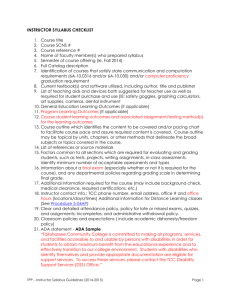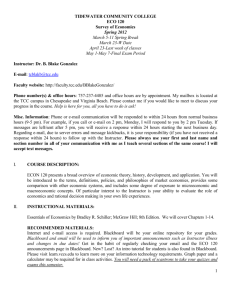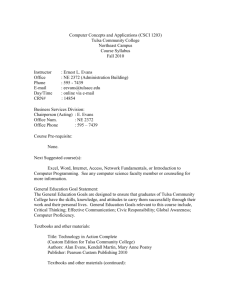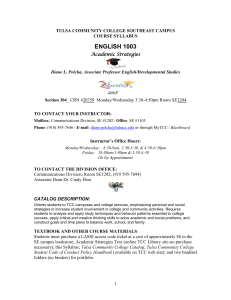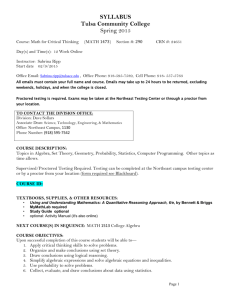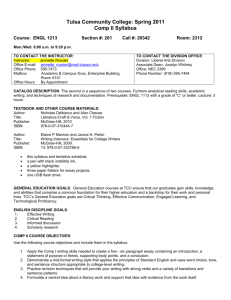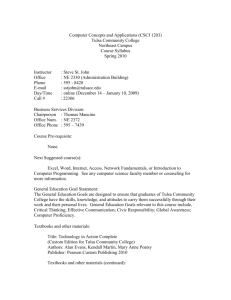TULSA COMMUNITY COLLEGE
advertisement
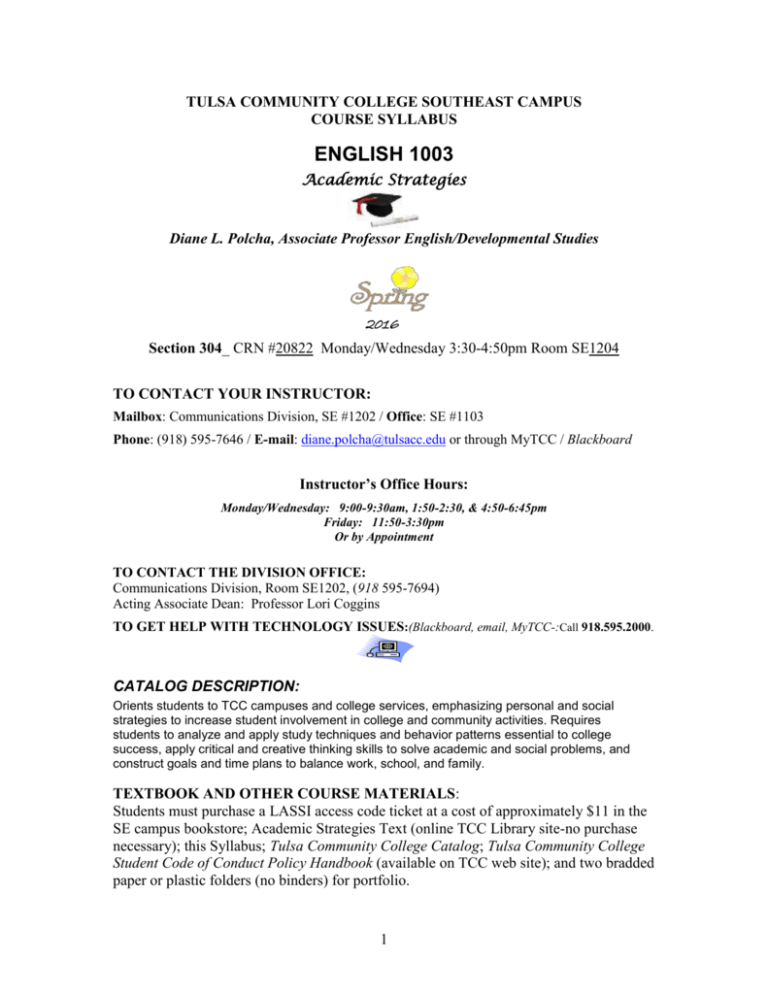
TULSA COMMUNITY COLLEGE SOUTHEAST CAMPUS
COURSE SYLLABUS
ENGLISH 1003
Academic Strategies
Diane L. Polcha, Associate Professor English/Developmental Studies
2016
Section 304_ CRN #20822 Monday/Wednesday 3:30-4:50pm Room SE1204
TO CONTACT YOUR INSTRUCTOR:
Mailbox: Communications Division, SE #1202 / Office: SE #1103
Phone: (918) 595-7646 / E-mail: diane.polcha@tulsacc.edu or through MyTCC / Blackboard
Instructor’s Office Hours:
Monday/Wednesday: 9:00-9:30am, 1:50-2:30, & 4:50-6:45pm
Friday: 11:50-3:30pm
Or by Appointment
TO CONTACT THE DIVISION OFFICE:
Communications Division, Room SE1202, (918 595-7694)
Acting Associate Dean: Professor Lori Coggins
TO GET HELP WITH TECHNOLOGY ISSUES:(Blackboard, email, MyTCC-:Call 918.595.2000.
CATALOG DESCRIPTION:
Orients students to TCC campuses and college services, emphasizing personal and social
strategies to increase student involvement in college and community activities. Requires
students to analyze and apply study techniques and behavior patterns essential to college
success, apply critical and creative thinking skills to solve academic and social problems, and
construct goals and time plans to balance work, school, and family.
TEXTBOOK AND OTHER COURSE MATERIALS:
Students must purchase a LASSI access code ticket at a cost of approximately $11 in the
SE campus bookstore; Academic Strategies Text (online TCC Library site-no purchase
necessary); this Syllabus; Tulsa Community College Catalog; Tulsa Community College
Student Code of Conduct Policy Handbook (available on TCC web site); and two bradded
paper or plastic folders (no binders) for portfolio.
1
LEARNING OUTCOMES (Our Goals):
Students who are successful in the Academic Strategies course will be able to:
Demonstrate use of TCC college resources, support systems, technology, and
terminology specific to higher education. (MyTCC, Blackboard, Academic Terms list,
student service orientations, Academic Activities)
Evaluate personal and social strategies to communicate and work in varied
learning situations among diverse populations in college; self-identify barriers
affecting motivation and create strategies to overcome barriers.(academic & campus
activities, student interviews, service learning, college fairs, diversity essay, group work)
Create long and short term plans to balance school, work, family, and wellbeing
using goals and day planners. (Weekly Study Schedule, Study Center, Day
Planner/Academic Planner, Learning Goals, My Success Plan)
Create study strategies and behavior patterns to successfully complete college writing,
reading, and mathematics assignments and exams, demonstrating transference of learned
skills to other courses. (Study Skills Strategies assignments, Exam Review, Portfolios)
TEACHING METHODS:
This class will be conducted as an academic support group for students and as a
workshop consisting of brief lectures, discussions, group activities, learning experiences,
guest speakers, and portfolio assessment.
WRITING CENTER / MATH LAB:
Assistance in reading, writing, and study skills is available in the Writing Center in
Library, 2nd floor building #7.
Workshops and individual tutoring by appointment are also provided by the Writing
Center. Workshops and tutoring sessions may be used for Strategies Academic Activity
credit.
Assistance in mathematics and individualized tutoring for math and science courses is
available in the Math Lab located on 1st floor in building #8. Math or science tutoring
and science seminars may be used for Academic Activity credit.
EVALUATION:
Course grades will be determined by the following:
o
o
o
o
o
o
o
Study Skills Strategies
Diversity Essay & Proposal
Library Quiz & Quote Log
Academic & Community Activities
Mid-Term Exam
Mid-Term PORTFOLIO
Final PORTFOLIO
2
10%
10%
10%
10%
10%
25%
25%
GRADING SCALE:
90-100%= A
80- 89%= B
70- 79%= C
60- 69%= D
0- 59%= F
(excellent; full mastery of assignment)
(good; strong fulfillment of assignment)
(average; satisfactory fulfillment of assignment)
(poor; less than satisfactory or incomplete)
(failing; missing, late, incorrect, or plagiarized)
ATTENDANCE POLICY:
Students are expected to attend class regularly and to be on time. More than three class
hours of absence will be considered excessive and may be reported to the Dean of
Students. Excessive absence makes successful completion of the class difficult or
impossible. After each absence, the student is responsible for obtaining the assignments
and completing any work missed. Most in-class assignments cannot be made up;
Participation and class activity points cannot be made-up. Weekly assignments will not
be accepted after the due date. No major assignments (mid-term exam, portfolios)
will be accepted after the due date without instructor approval on or before the due
date. Approved make-up work must be submitted in a timely manner—within a
week from the time the student is able to return to class.
EMAIL:
Students should communicate with instructor in person during class or office hours, by
phone, through Outlook email, and through Blackboard email portal. Personal email
addresses should not be used for communicating about the course. All TCC students
receive a designated Outlook email address (ex: jane.doe@tulsacc.edu ). Students are
expected to check their Outlook email regularly and to check announcements, grade
status, and assignments on Blackboard. Students will be held responsible for assignment
and schedule information provided on Blackboard which can be checked from home or
on campus. Students must use Blackboard or Outlook to send and receive email from
their instructor and from other students regarding this course. Outlook & Blackboard can
be accessed through the TCC web site (www.tulsacc.edu ) by using student id# and
password in MyTCC.
Do NOT email assignments to your instructor. Work must be submitted during
class or to instructor’s mailbox in Communications Division Office (SE 1202).
COURSE WITHDRAWAL:
The deadline to withdraw from a course shall not exceed 3/4 the duration of any class.
Contact the Advisement Office at any TCC campus to initiate withdrawal from a course
('W' grade) or to change from Credit to Audit. Check the TCC Academic Calendar for
deadlines. Students should consult instructor before withdrawing from a course.
You cannot withdraw using MyTCC; instead you must go to the Advisement office
as directed in above paragraph. (Last day to withdraw for this course: April 8 )
You can only add or drop using MyTCC. Drop deadline is January 22nd . If you do
not attend class or make contact with the instructor prior to Jan.22nd, you will receive a
“WN” for the course and you are financially responsible (see Registration for policy).
3
Non attendance does NOT constitute an official withdrawal. Do not simply
stop attending ANY class! Students who stop participating in the course and fail to
withdraw will receive a course grade of “F,” which may have financial aid consequences
for the student. Withdrawal and/or change to an Audit from a course after
the drop/add period may alter the financial aid award for the current
semester and future semesters. Students may receive an outstanding
bill from TCC if the recalculation leaves a balance due to TCC.
English Professors may assign "AW" or "I" grades only when genuine
emergencies prevent a student from completing the class and/or from withdrawing before
the deadline and only when the student is earning a satisfactory ("C" or better) grade.
Inclement Weather:
TCC rarely closes. If extreme weather conditions or emergency situations arise, TCC
always gives cancellation notices to radio and television stations. This information is also
posted on the TCC website (www.tulsacc.edu) and can be accessed through the
switchboard message at the TCC phone number (918 595-7000).
Consult Blackboard course site or Outlook email for specific course directions for this
course in extreme conditions.
General Education Goal Statement:
Tulsa Community College graduates value cultural diversity, ethical behavior, and the unique role
of public education in sustaining a free society. The following general education goals function
independently and in concert. TCC graduates demonstrate:
Communication Skills - effective written, oral, visual, technological, and interpersonal
interactions.
Critical Thinking - aesthetic and qualitative reasoning for creative inquiry, analysis, synthesis,
and evaluation of information, both abstract and concrete.
Empirical Skills - problem solving and quantitative reasoning in support of scientific and
mathematical concepts.
Teamwork - the ability to collaborate in support of shared purposes and goals.
Personal Responsibility - choices and actions that recognize consequences and exhibit ethical
decision-making.
Social Responsibility - the ability to evaluate one’s own ethics and traditions in relation to others
and to embrace the diversity of human experience while engaging local, regional, and global
communities.
Standards of Conduct & Classroom Etiquette:
Open and mutually respectful communication of varied opinions, beliefs, and perspectives during
classroom or online discussion encourages the free exchange of ideas that is essential to higher
learning and to the ability to learn from each other. A student who exhibits behavior in the
classroom which interferes with the learning environment or conduct which is disrespectful to the
instructor or other students will be asked to leave the classroom and may be referred to the Dean
of Students.
Students are expected to be in class on time and to remain until the class is dismissed. A student
who is late for class or has missed a class should not interrupt the class to determine what he/she
has missed; if a student must leave the classroom before the end of class, he or she should not
4
interrupt the class to get assignments yet to be completed or assigned. It is the student’s
responsibility to obtain this information outside of class time. Students should schedule travel and
medical or other appointments at times other than class time. Cell phones should be set so no
disruption of class will occur. Students are responsible to clean up after themselves in the
clasroom. Participation in class activities is an important part of the learning process, and
an atmosphere conducive to gleaning the most from the session should be a priority for the
each class member.
FORMAT:
Diversity Essay and Quote Log should be typed and double spaced. All in-class writings and
strategies exercises must be double spaced and legibly written in blue or black ink on worksheets
provided on Blackboard/Content. Worksheets should be printed out from course site. Students
should write or type on one side of each page and provide one inch margins for professor’s
comments. Assignments should be submitted in class to professor or in Portfolio as assigned.
Essay and Quote Log should be submitted in Portfolio with the following heading in the upper
left hand corner of the page:
student’s name,
course title & time,
professor’s name,
assignment title, and
date submitted.
Late assignments or assignments not following the prescribed format will be rejected, but may
be used in portfolio for partial credit. Instructor’s mailbox is located in the Communications
Division Office (1202). Essay assignment (Diversity Essay) must meet criteria of assignment and
topic selected to be accepted for credit. Sources consulted or quoted must be documented.
Worksheets for study strategies and academic activities should be printed from Blackboard,
filled-out using complete sentences, answering all questions, and writing in black or blue ink; and
should be completed by the due date or submitted in Portfolio as assigned.
Plagiarism Policy:
Plagiarism is claiming, indicating, or implying that the words, ideas, or sentences of another writer are your
own; copying the work of another and presenting it as your own; or following the work of another as a
guide to ideas and expression that are then presented as your own. Students who turn in the same work will
both be considered to have plagiarized. Students should review the relevant sections of the TCC Student
Code of Conduct Policy Handbook. A student who is determined to have plagiarized will receive an "F" on
the assignment and may fail the course.
Academic Dishonesty or Misconduct:
Academic dishonesty or misconduct is not condoned nor tolerated at campuses within the Tulsa
Community College system. Academic dishonesty is behavior in which a deliberately fraudulent
misrepresentation is employed in an attempt to gain undeserved intellectual credit, either for
oneself or for another. Academic misconduct is behavior that results in intellectual advantage
obtained by violating specific standards, but without deliberate intent or use of fraudulent means.
The student should review the relevant sections of the TCC Student Code of Conduct Policy
Handbook, which can be found at
http://www.tulsacc.edu/page.asp?durki=2984&site=16&return=126
5
Guests:
Any person not officially enrolled in class will not be admitted without instructor’s prior
approval. Children will not be permitted in class.
ADA Policy:
It is the policy and practice of Tulsa Community College to create inclusive learning
environments. Accommodations for qualifying students in compliance with the Americans
with Disabilities Act (ADA) and Section 504 of the Rehabilitation Act are available. To
request accommodations, contact the Education Access Center (EAC)
at eac@tulsacc.edu or call (918) 595-7115 (Voice). Deaf and hard of hearing students may
text (918) 809-1864.
Institutional Statement:
Each student is responsible for being aware of the information contained in the TCC Catalog,
TCC Student Handbook, TCC Student Code of Conduct Policy Handbook, and semester
information listed in the Class Schedule.
PORTFOLIO GRADING:
An Academic Portfolio of student’s coursework worth 50% of the grade will be submitted once at
mid-term (25%) and once late in the semester (25%). Portfolio assessment enables students to
document mastery of the objectives by presenting evidence of the course outcomes of the
semester. The Portfolio will provide students with an individualized academic reference to be
used throughout their college experience—the result of their research and assessment of academic
strategies and support services. Students will participate in many learning activities and writing
exercises—individual and group, graded and ungraded. Students are advised to keep all written
exercises, revisions, worksheets, and handouts from the course. Since the loss or damage of the
course materials could jeopardize the Portfolio grade, course materials should be maintained with
care. The structure of the Portfolio will be explained in detail. To be accepted, the portfolio must
be submitted using correct format, bradded into a paper folder with pockets, and include the
completed Table of Contents assignment sheet. Portfolio must be submitted by due date unless
extension is approved by instructor. Any plagiarism in Portfolio will result in a failed assignment
or failed Portfolio. Students must turn-in a Mid-term and Final Portfolio to pass the
course.
Syllabus Changes:
Occasionally, changes to the syllabus may be necessary. Students will be notified of any changes
to the syllabus in writing.
Tobacco Free College:
Tulsa Community College is a Tobacco Free college in accordance with the Governor’s
Executive Order 2012-01 and Title 63 of the Oklahoma Statutes, Section 1-1523.
The TCC Campus Police is responsible for ensuring compliance with the Tobacco-Free
Environment Policy. Violations of the policy may be addressed through issuance of campus or
state citations.
6
Classmates/Team members for group work:
Name ____________________________
Phone _______________________
Email _______________________
Name ____________________________
Phone _______________________
Email _______________________
Name ____________________________
Phone _______________________
Email _______________________
Syllabus Notes:
________________________________________________________________________
________________________________________________________________________
________________________________________________________________________
________________________________________________________________________
________________________________________________________________________
________________________________________________________________________
________________________________________________________________________
________________________________________________________________________
________________________________________________________________________
7
